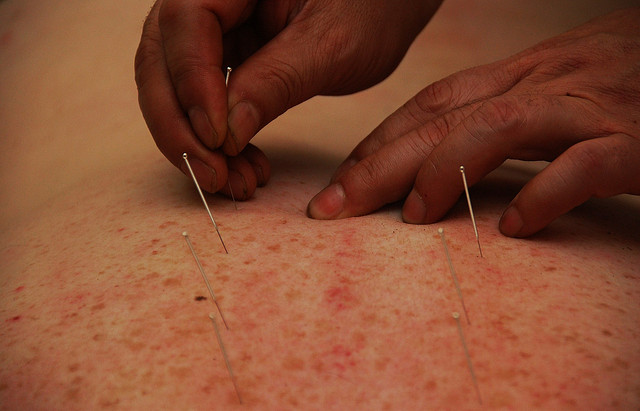
Acupuncture can help improve quality of life in breast cancer patients, says a new study.
Acupuncture is an ancient Chinese treatment that involves inserting thin, solid needles into acupuncture points in the skin.
In the study, two months electroacupuncture (EA) therapy - an acupuncture technique that involves small electric current passing through needles - helped manage fatigue, anxiety, depression and joint pain associated with breast cancer treatment aromatase inhibitors (AIs).
Aromatase inhibitor (AIs) is a hormone therapy that is widely used to prevent cancer recurrence in post-menopausal women with early stages of hormone receptor- positive breast cancer. However, due to the severe side effects associated with the medication, many women often discontinue the treatment before completing the treatment course. This tendency to leave treatment half way can lead to adverse outcomes including death.
During the study, patients received either electroacupuncture (EA), sham acupuncture (where the needles were not kept long but removed immediately after insertion) or usual care. All the participants were taking Aromatase inhibitors (AIs) and were also troubled with persistent joint pain. Researchers recorded patients' discomforts and health condition before, during and after the treatment.
Patients who received acupuncture reported 2.0 point reduction in fatigue, 2.2 point reduction in anxiety and 2.4 point reduction in depression.
"Our study provides a novel understanding of how fatigue, sleep and psychological distress relate to pain in patients with AI-related joint pain. More importantly, we found that acupuncture helped reduce these symptoms and the effects persisted for at least four weeks following treatment," lead author of the study Jun Mao, associate professor of Family Medicine and Community Health in Penn's Perelman School of Medicine in US, said in a news release.
"There is a small but growing body of literature showing that acupuncture is effective for the management of pain, fatigue, anxiety and depression. However, studies with larger sample sizes and longer follow-up periods are needed to provide more in-depth knowledge about how these treatments, combined with usual care, are improving quality of life for our patients."
The study reported in the journal Cancer supports a 2012 study that appeared in the Journal of Clinical Oncology. Alex Molassiotis from the University of Manchester looked at 300 breast cancer patients undergoing acupuncture and found that the technique helped relieve physical and mental fatigue, anxiety and depression associated with breast cancer treatments.

















